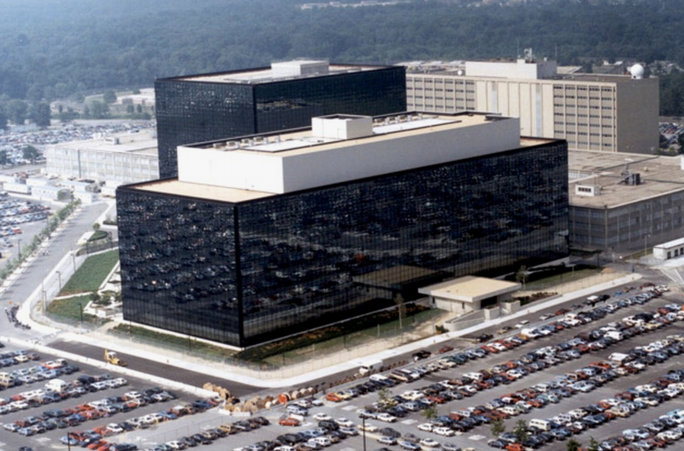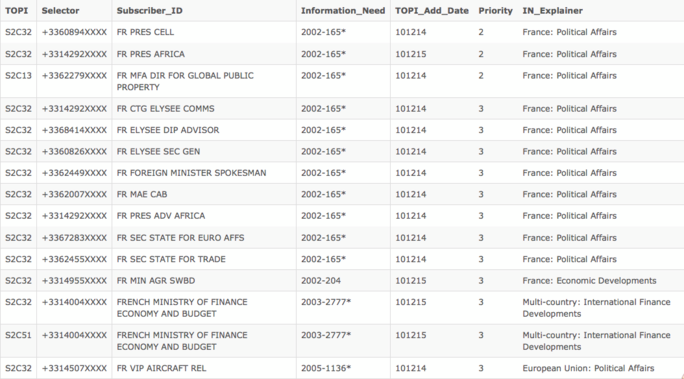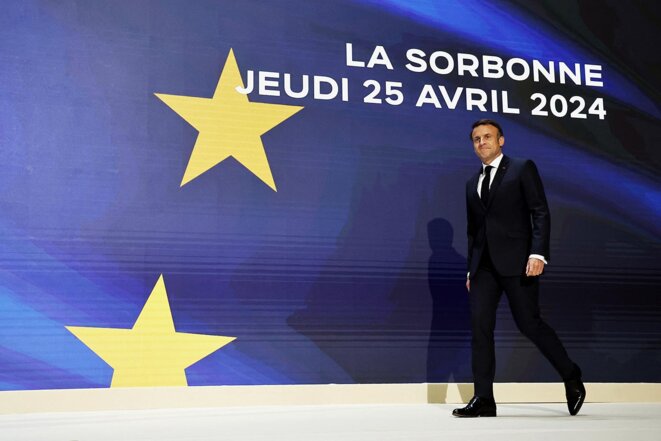The United States has eavesdropped on at least three French presidents and a whole range of senior officials and politicians in France for at least six years, according to confidential documents obtained by WikiLeaks and revealed here by Mediapart. The top secret reports from America's National Security Agency (NSA) show that the phones of presidents François Hollande, Nicolas Sarkozy and Jacques Chirac were all tapped, as were those of senior diplomats, senior civil servants and politicians.
The documents seen by Mediapart working with WikiLeaks as part of Operation Espionnage Elysée (Operation Elysée Espionage), show the extent of spying on the top echelons of the French state between 2006 and 2012. But there is no reason to suppose that the spying did not start before 2006 – and that it has not continued since.
However, after Mediapart's disclosures on Tuesday June 23rd, the White House insisted that it was not targeting François Hollande's communications, and nor would it do so in the future. “We are not targeting and will not target the communications of President Hollande,” said National Security Council spokesman Ned Price. “We do not conduct any foreign intelligence surveillance activities unless there is a specific and validated national security purpose. This applies to ordinary citizens and world leaders alike,” he said. “We work closely with France on all matters of international concern, and the French are indispensable partners.” Significantly, the spokesman did not deal with the revelations about surveillance in the past.
For these leaked documents – all marked 'Top Secret' and also seen by Libération – detail the background to an obsessive spying by the United States on France on all manner of diplomatic, political and economic issues. That Washington was eavesdropping on the leaders of allies such as France has long been suspected but these revelations from NSA reports now provide firm and detailed evidence of that spying.

Enlargement : Illustration 1

And above all the documents reveal the hitherto unsuspected scale of the American spying, which was carried out outside any legal framework and without being subject to any real control. For it is not just successive presidents of the French Republic who have been eavesdropped in recent years, but senior figures at all layers of state power who have, at one time or another, been the target of the US. This spying has been carried out on directors of major French organisations, ministers, presidential and ministerial advisors, diplomats and spokespeople. For example, even at the very heart of the Elysée, the official residence of the French president, numerous telephone lines, both landlines and mobile, have been tapped.
The image of the NSA has already been severely tarnished by the revelations by whistleblower Edward Snowden in 2013 and these latest documents will once again throw the spotlight on the aggressive and underhand practices on the part of the world's major power in respect of a country, France, which is normally considered to be a “friend”.
Like his two right-wing predecessors, presidents Sarkozy and Chirac, socialist president François Hollande has not escaped the US eavesdropping. The leaked documents include a NSA report from May 22nd, 2012 which makes an explicit reference to a conversation held four days earlier between the newly-elected French president and his then-prime minister Jean-Marc Ayrault. The conversation deals with François Hollande’s desire to organise “secret consultations” with the German opposition about a potential Greek exit from the Eurozone – a subject very much in the news today.
In the same document (see below) the NSA analysts mention the existence of “previous reports” concerning past discussions on the subject of German chancellor Angela Merkel. This suggests that the American intercepts of the French president's calls were certainly common practice.
Contacted by Mediapart, sources at the Elysée said that, while they had not kept a trace of this conversation, the claim that it took place was “absolutely credible”. But on the underlying allegations the French presidency declined to comment. Presidential sources did, however, note that ahead of the meeting between François Hollande and American president Barack Obama in Washington on February 11th, 2014, and then during the meeting itself there was an “undertaking to no longer carry out indiscriminate eavesdropping of the state services of an allied country”.
'Top Secret' documents

Enlargement : Illustration 2

As with the majority of documents obtained by Wikileaks, the NSA report from May 2012 that targets François Hollande is headed with numerous initials and acronyms which, once they are decrypted, reveal the ultra-sensitive nature of the information that is now being published. Marked “Top Secret” (TS), these notes deal with intelligence obtained through electronic signals (marked SI for SIGINT, meaning “signal intelligence”) and which on no account were to be shared with a foreign country (NF for NOFORN or “No foreigners”). The report on Hollande, like many others, also has the word “unconventional”, which in NSA language means that the intelligence has been obtained from non-conventional operations.
In the same report on Hollande there is also an additional phrase which is of critical importance: “Foreign Satellite”. This means that the telephone interception was carried out by non-American equipment. Today all the suspicion centres on German satellites as being the equipment involved, though there is as yet no absolute proof of this. In recent months various media outlets have revealed the way that the German intelligence services, the BND, have carried out spying operations on behalf of the Americans. This has sparked a huge outcry in Germany where a Parliamentary inquiry has been opened to unearth precisely the kind of documents that Wikileaks has obtained.
In additional to the current French head of state, other senior French figures have been eavesdropped. According to documents in Mediapart's possession, former presidents Nicolas Sarkozy and Jacques Chirac, the former socialist economy minister, now European Commissioner, Pierre Moscovici and the former French ambassador to Washington, Pierre Vimont, have also been spied on.
Judging from the leaked documents, the American appetite for intelligence on France is vast. Another secret NSA document (see below), written during the presidency of Nicolas Sarkozy (2007 to 2012), reveals the list of French targets drawn up by the United States. The targets were: Nicolas Sarkozy via his personal mobile phone, plus the mobiles of the presidential diplomatic advisor Jean-David Levitte, the secretary general at the Elysée Claude Guéant, the foreign ministry spokesman Bernard Valero, an unidentified senior figure at the foreign ministry and the minister of overseas trade Pierre Lellouche.

Enlargement : Illustration 3

Claude Guéant, who was also interior minister under Sarkozy, described the eavesdropping as “scandalous”. He said: “The French government must react as it sees fit. As a minimum it requires an explanation at the very highest level, an absolute commitment to put an end to these practices.”
Former minister and current MP Pierre Lellouche said he was “not surprised” by the revelations. “I was a great friend of America. I am less and less so,” he said. “It doesn't surprise me to have been listened to because I was at overseas trade and that interests the Americans a great deal, industrial espionage.”
But it was not only mobile phones that were targeted. The landlines of the African advisors at the Elysée were also tapped, as were the phone exchanges at the ministries of agriculture and finance. The list of targets also included the antenna of the Centre de transmission gouvernemental (CTG) which is based at the Elysée. This centre's role is to maintain, under the cloak of the strictest secrecy, the continuity of government communications and, in particular, those of the head of state and the prime minister. Another phone number, referred to under the heading “FR VIP AIRCRAFT REL”, refers to a line used by the French government’s fleet of aircraft, ETEC, which is run by the French air force.
Over and above the scandal which the American espionage revealed today will cause, there will also be serious questions over how easy it seems to have been for the US to intercept conversations of the most senior figures in France, and over the effectiveness of the counter-interference techniques employed by France's own intelligence services.
-------------------------------------------------------------------
- The French version of this article can be found here.
English version by Michael Streeter





